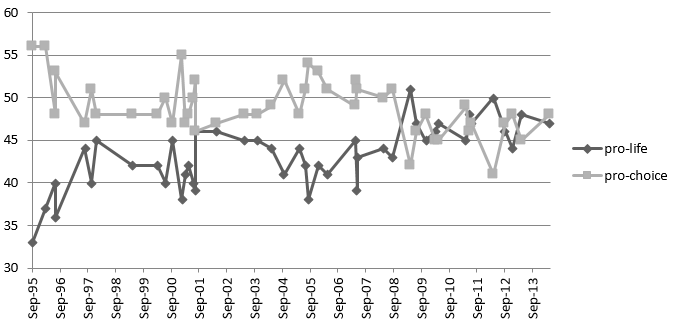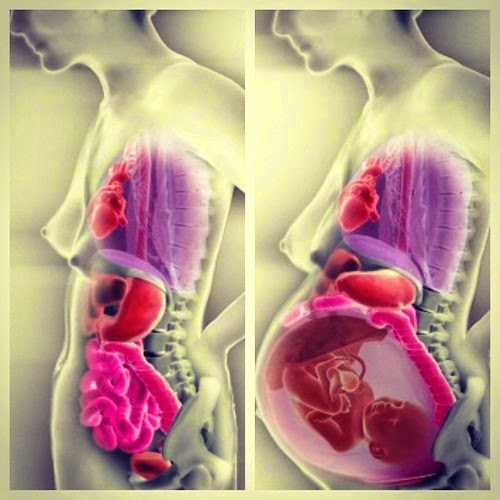Expect More: Abortion Views, Expert Opinions and Why We Can Win Much Sooner Than You Think
[Today’s guest post is by Michael Crone and Philip Hamilton.]
Gallup data, gauging the opinions of respondents nationwide from 1995 to 2014, demonstrates that Americans are expressing more support for pro-life positions in present day than they did during the past two decades. In the 1990’s an overwhelming majority of Americans supported pro-choice positions. Today there is a “statistical tie,” and in fact pro-life supporters maintain a slight majority. But despite the fact that the pro-life movement is enjoying a period of unprecedented popularity, most respondents (51% to 35%) perceive the public to be pro-choice. That explains why pro-life politicians continue to fear losing votes.
Another factor that needs to be taken into consideration wording of polling questions. Public opinion of life issues can greatly vary based on simple wording. For example, the position that abortion should be “legal only in a few circumstances” had 38% support, while a phrase with nearly the same meaning—“illegal in most circumstances”—had only 13% support in a poll conducted around the same time. Such sensitivity is inconsistent with the widely stated claim on both sides that people are set in their views. This provides both an opportunity to see how to frame our message as pro-life activists and politicians, and hope that abortion views can be changed.
One way the mood changes is based on what they people their leaders saying. Look at the polling results shown above again. The best result for “pro-life” and the beginning of our current “statistical tie” era came as a sudden spike in May 2009. One event related to the life issues from that time stands out. President Obama received an honorary degree from the University of Notre Dame, despite protests from pro-life activists that an agency of the Catholic Church should not honor a politician that favored abortion rights. At the time, I viewed this as a failure for the pro-life cause; it further associated the pro-life movement with Catholicism, and the protests, despite being highly visible, failed to affect Notre Dame’s decision. But looking back now, I can see how the debate around this degree helped the cause: Obama was not defending his position on abortion rights. Instead, he changed the subject to emphasize “common ground” issues, particularly related to his community organizing. This response was a signal to the American public that the pro-choice label was undesirable. Similarly, in May 2011-May 2012, the media focused heavily on the Republican primary candidates who were publicizing their pro-life views, and the public again responded by self-identifying as more pro-life. Unfortunately, of course, this works both ways. For instance, when Romney de-emphasized his pro-life stance in the general election and Obama defended his pro-choice stance, “pro-choice” responses ticked back up, and “pro-life” responses fell.
The lesson of all this for pro-life activists is that we need to be cautious about choosing a politician who will shy away from abortion in attempt to choose someone electable. FDR was reported to tell activists, “I agree with you, I want to do it, now make me do it.” As political activists for the right to life movement, this means getting out of your comfort zone, and getting involved in your local party (Democratic, Republican, or otherwise) to defend the unborn. If you are a Republican, you can exercise considerable influence by signing up to be a delegate for the National GOP convention in 2016.
For politicians, the lesson is 1) that there is a large, untapped resource of pro-life voters who have not been satisfied, and 2) that much of the rest of the public can be lead to a pro-life position by a clear, consistent voice on abortion. A broad focus on “values” is not enough: the public support is specifically on the pro-life issue. Doors will open for candidates who make the case for life compassionately and confidently.
Michael Crone has a PhD in Mathematics from George Mason University and an MS in Mathematics from the University of Wyoming. He has worked as a statistical analyst, polling director, and radio talk co-host. Contact him at mcrone@masonlive.gmu.edu.
Philip Hamilton obtained a Bachelor’s of Science in Administration of Justice from George Mason University and a Master’s of Science in Administration of Justice and Security from the University of Phoenix. Currently, he is the Deputy Editor of the online newspaper Fairfax Free Citizen. He may be contacted at HamiltonForLiberty@gmail.com.



Leave a Reply
Want to join the discussion?Feel free to contribute!